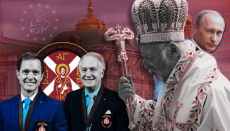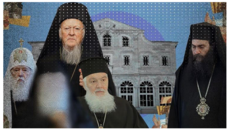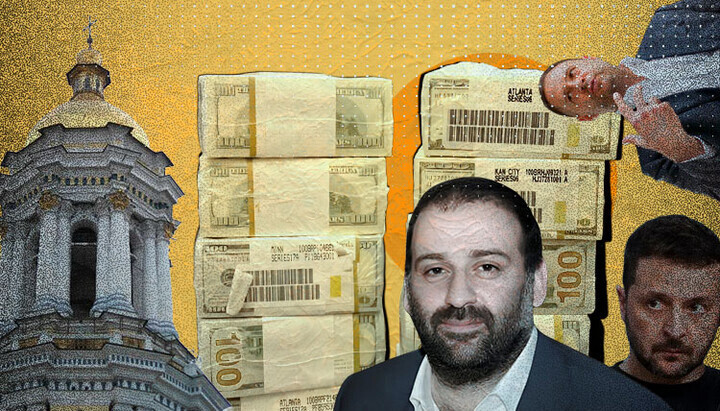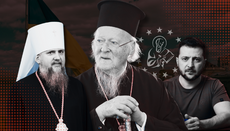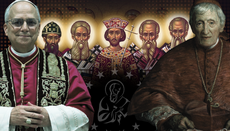On Public Orthodoxy’s Gender Confusion: A Response to Nik Jovcic-Sas
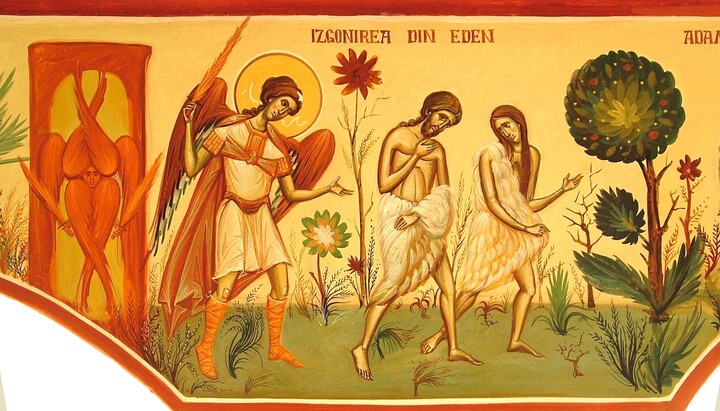
Examining the Theological and Pastoral Missteps of Public Orthodoxy Through the Lens of Patristic Tradition
On June 30, Public Orthodoxy published an article by Nik Jovčić-Sas, a well-known advocate for LGBTQ+ ideology in the UK. The piece, titled “We Need to Talk About Trans People,” invites a discussion—so let’s have one.
Jovčić’s basic defense of homosexuality and cross-dressing consists of the same tired claims made by those whose pride prevents them from confronting sin: that it’s not truly a sin, that Scripture hardly mentions it, and that only “fundamentalists” object to it. From the outset, his arguments rest on misinterpretations and shallow readings of Scripture and Tradition. So before we turn to what the Church Fathers actually say about sexual sin, we’ll address some of the more elementary errors in his article. Because on one thing, Jovčić is right: sexual sin is nothing new. Where he is wrong is in attempting to define a person by their sin—to redefine human nature itself in light of one’s personal passions. But we’ll return to that shortly.
Jovčić begins his piece (after the obligatory jabs at Donald Trump) with the following claim:
“In the Orthodox Church, our discourse on LGBTQ+ rights has focused primarily on same-sex relationships—leaving the question of transgender inclusion underexplored, and this lack of engagement has created a divergence in responses.”
And perhaps he's right, in part.
We’ve spent so much time emphasizing that a man dressing as a woman and sleeping with men is still engaging in a homosexual relationship that we’ve perhaps neglected the deeper philosophical error: that gender is something flexible. But long before “fundamentalist Protestants” ever converted to Orthodoxy—something Public Orthodoxy writers love to bring up—there were the Israelites. And they, as Scripture shows, were no strangers to moral confusion.
Moses, in particular, records the creation of man for us in Genesis:
“And God said, Let us make man in our image, after our likeness... So God created man in his own image, in the image of God created he him; male and female created he them...” [Gen.1:26–28]
There it is—male and female He created them. In the next chapter, God forms woman from man, declaring that man needs a helper “like him.” Notice: God does not create another male, nor does He create some intermediate form. Gender, as binary and God-given, is rooted in creation itself. Jovic references this passage but tries to dismiss its clear meaning with rhetorical flourishes that fall flat.
He quotes Fr. John Behr to argue that:
“In that transformation, categories of male and female are transcended... our shared humanity in Christ [matters], and our sex no longer defines us.”
There’s irony here. Jovčić argues that sex shouldn’t define us, yet he is obsessed with sexual identity. And his metaphor—comparing gender to iron and bronze in fire—fails. Iron in fire remains iron; bronze remains bronze. If anything, the analogy affirms the persistence of essential distinctions, not their abolition.
Then there’s his bizarre appeal to eunuchs in Matthew 19:12, where Christ says:
“There are eunuchs who have been so from birth...”
Jovčić argues this implies a “non-binary” identity. But nothing in the passage supports that claim. Christ is speaking about celibacy—voluntary and involuntary—not gender identity. To understand Christ’s teaching on gender, one need only look eight verses earlier:
“Have ye not read, that he which made them at the beginning made them male and female, and said, For this cause shall a man leave father and mother, and shall cleave to his wife: and they twain shall be one flesh?”" [Mat. 19:4-6]
This is precisely why biblical verses must not be read in isolation. Jovčić admits that the Church Fathers didn’t interpret this passage the way he does, and for good reason. His interpretation rests not on historical or theological analysis, but on ideological wishcasting.
Let’s examine what St. Paul says instead:
“Do you not know that the unrighteous will not inherit the kingdom of God? Do not be deceived: neither fornicators, nor idolaters, nor adulterers, nor effeminate (Gr: μαλακο, malakoi), nor homosexuals (Gr: ἀρσενοκοῖται, arsenokoitai), nor thieves... will inherit the kingdom of God.” [1 Cor. 6:9–11]
Some modern scholars try to soften these terms, suggesting they refer only to exploitative relationships or cultural norms. But the Greek is explicit: malakoi referred to "passive" homosexual partners and, at times, cross-dressing male prostitutes. Even today, malakas in modern Greek remains a vulgar term. The condemnation is clear.
Now, to the eunuchs. Jovčić is correct that eunuchs held important roles in Byzantium. But they were always understood as men. Castrated men, yes—but still male. They were barred from the imperial office precisely because they were not seen as a “third gender,” but as lesser men in worldly terms. Their loyalty was valued because they posed no dynastic threat. Consider General Narses, whom Justinian trusted more than Belisarius—the far superior general—precisely because Narses could not claim the throne.
Jovčić claim that eunuchs were viewed as gender-fluid is simply false. In Byzantium, eunuchs were addressed as men—he/him—and no theological or cultural precedent existed for calling them anything else.
The same applies to St. Marina (also called Marinos), whom Jovcic claims might have “identified” as male. This too is absurd. Marina disguised herself to follow her father into monastic life, seeking safety in a world that offered few options to orphaned girls. Her silence when falsely accused was an act of humility and endurance, not “gender identity.” To portray this as proto-trans ideology is to erase both the saint’s ascetic struggle and the harsh realities of the ancient world—particularly for orphaned girls and single mothers.
This is the enduring flaw of critical theory: it projects modern ideologies onto ancient texts, ignoring historical context. When all you have is a gender hammer, every story looks like a trans nail.
Jovčić similarly misrepresents the pastoral wisdom of Patriarch Pavle of Serbia. In his article, he claims: “As early as 1986, Patriarch Pavle gave a statement in which he said that transgender individuals should be allowed to take communion and participate fully in the sacramental life of the Church.” Jovčić cites this in support of the 2019 baptism of Vuk Adžić, a transgender man, as justified by the Metropolitanate of Montenegro. But this is a distortion of Patriarch Pavle’s words and intent—as a spiritual son of the reposed Patriarch recently confirmed in conversation.
To begin with, Pavle was not Patriarch of Serbia in 1986. More importantly, the statement in question had nothing to do with transgenderism. It concerned hermaphroditism—a rare but real intersex condition where a child is born with both male and female reproductive organs. In this case, then-Bishop Pavle offered guidance to clergy and parents on how to approach such biological anomalies with pastoral clarity and compassion.
He ruled that if a child is born with ambiguous genitalia, the parents, in consultation with medical professionals, should determine the sex in which the child will be raised. Once that decision is made, corrective surgery may be performed, the child’s gender is to be recorded accordingly on the birth certificate, and the Church would baptize the child under that affirmed sex. The child is to be raised clearly and consistently as either male or female.
In some rare cases, hermaphroditism is not apparent at birth and may only manifest at puberty, when internal organs develop or secondary sex characteristics emerge. In these situations, Pavle advised that corrective medical treatment be undertaken, and affirmed that such individuals are not to be denied participation in the sacramental life of the Church.
And here lies the purpose of his statement: some clergy, uncertain about whether such individuals could receive communion, had raised the question. Pavle responded with pastoral clarity, making a ruling on biological intersex conditions, not transgenderism. To conflate the two—as Jovčić does—is both dishonest and medically incoherent.
Patriarch Pavle’s pastoral guidance is completely in line with the Church’s timeless witness on gender—unlike the activist revisionism promoted by Public Orthodoxy.
Christianity's Radical Equality of the Sexes
Christian teaching on creation and the equality of men and women was indeed revolutionary in the ancient world. But when the Fathers speak of “transcending gender,” they speak spiritually—not biologically. In pre-Christian societies, women were often seen as defective males. Aristotle, for example, in his Generation of Animals, claimed that the male provides the form and soul, while the woman merely supplies raw matter. If a fetus became female, he taught, it was due to insufficient “heat” during conception—a failure to become fully male.
His Nicomachean Ethics (a text highly influential in post-schism Western thought) goes further, arguing that men possess a more complete rational soul than women and are therefore naturally superior. In such a context, the Christian claim—that both man and woman were created in God’s image, that both are called to holiness, and that in Christ there is “neither male nor female” [Gal. 3:28]—was radical. But this was not a denial of biological sex; it was a call to moral equality, to ascetic transcendence. Women and men alike were called to purity, to self-denial, to spiritual struggle. In destroying the distinction of gender as gifted in creation, Jovčić and his allies also destroy the power of the Gospel to redeem both sexes together as one humanity, not as formless androgynes.
Homosexual Lust: Not an Identity
There is no such thing as a “homosexual” in the Orthodox tradition—not as an ontological category, at least. To claim that someone is homosexual or transgender, as if it were an essential aspect of their being, is to make a category error. It elevates a sinful inclination to the level of a defining attribute or even a created “nature.” Same-sex attraction is a passion—a distortion of desire—not an identity.
Yes, homosexual lust is particularly unnatural, but it is still just lust. A man who lusts after women is not ontologically labeled a “fornicator.” He is a man struggling with sin—just as any of us are. We don’t categorize people into spiritual castes based on which sins tempt them. That, ironically, would be a kind of gnostic essentialism: defining souls by their passions, rather than their repentance.
This is an area where the Church perhaps needs to speak more clearly. The truth is this: same-sex attraction is not an identity, and as such, it can be healed. It is not immutable. The Church, through her ascetical and sacramental life, offers transformation. The passions can be conquered. And we have powerful witnesses to this truth—saints who struggled with same-sex desire and overcame it through prayer, fasting, and humility.
One such witness comes from the Letters of Saints Barsanuphius and John, in which the venerable elder Barsanuphius guides a young monk, later canonized as St. Dorotheos of Gaza. In Question 255 (translated by Fr. Seraphim Rose), St. Dorotheos confesses his deep turmoil:
“Pray for me, my Father, I am very much disturbed by thoughts of sexual sin, despondency, and fear; and a thought says to me that I should converse with a brother to whom I am attracted when I see him, lest by my silence I give him occasion for suspicion. I feel likewise that the demons are somehow pressing me, and I fall into fear.”
St. Barsanuphius replies with understanding, encouragement, and clarity:
“Brother! You are not yet instructed in warfare with the enemy, which is why there come to you thoughts of fear, despondency, and sexual sin. Stand against them with a firm heart, for combatants, unless they labor, are not crowned… I also in my youth was many times and powerfully tempted by the demon of sexual sin… For five years I acted thus every day, and God relieved me of these thoughts. This warfare is abolished by unceasing prayer with weeping.”
Barsanuphius doesn’t ask what kind of lust it is. He doesn’t create new moral categories based on the object of desire. Lust is lust. Whether heterosexual or homosexual, the path to victory is the same: repentance, vigilance, and prayer. And notice: the holy elder himself was powerfully tempted by lust in his youth. The saints were not aliens. They knew the depths of temptation, and they also knew the way out.
Contrast this with Public Orthodoxy. Had St. Dorotheos written them, they might have responded: “Don’t worry! There’s nothing wrong with you. God made you this way. You’re just gay. You do you!” In the name of "love," they deny the Cross. In the name of "acceptance," they block the path to healing. They do not love their brothers—they abandon them.
St. Paul’s warning comes to mind here:
“Though they know God’s decree that those who do such things deserve to die, they not only do them but approve those who practice them.” [Rom. 1:32]
Such is the fruit of theology unmoored from the Cross: not compassion, but betrayal.
